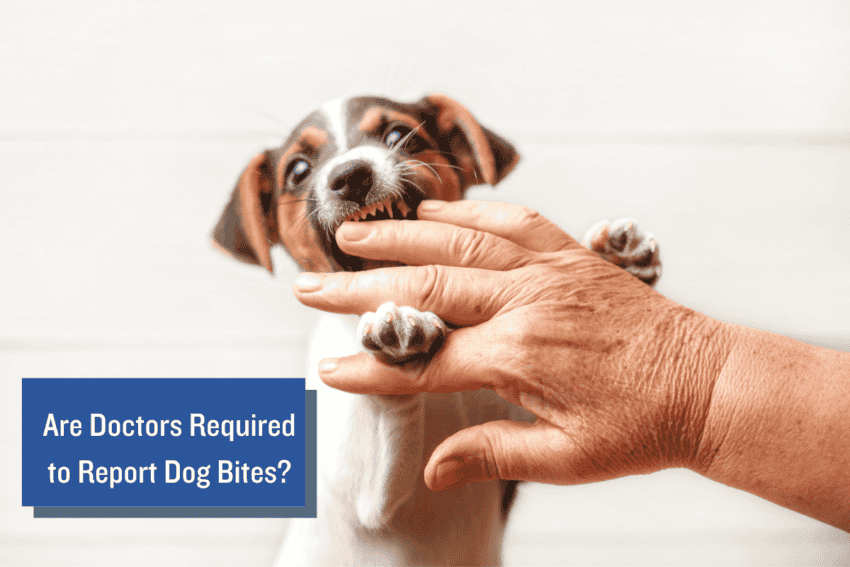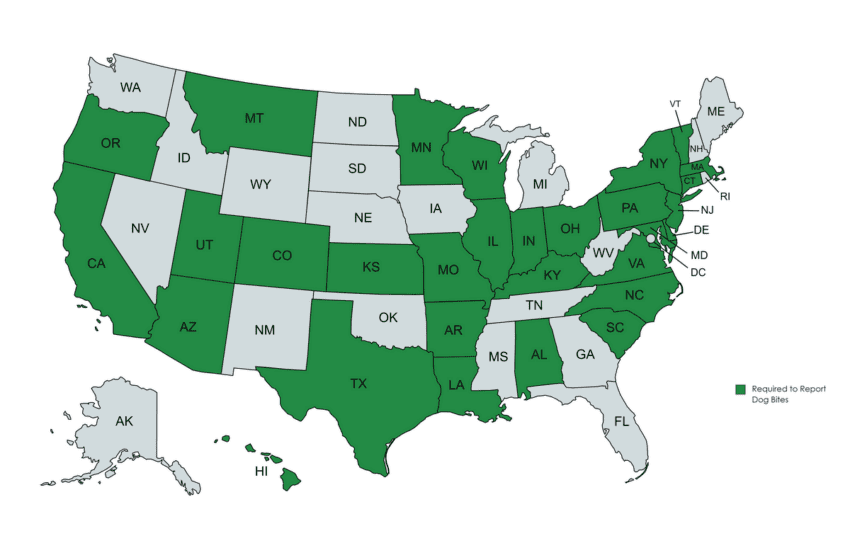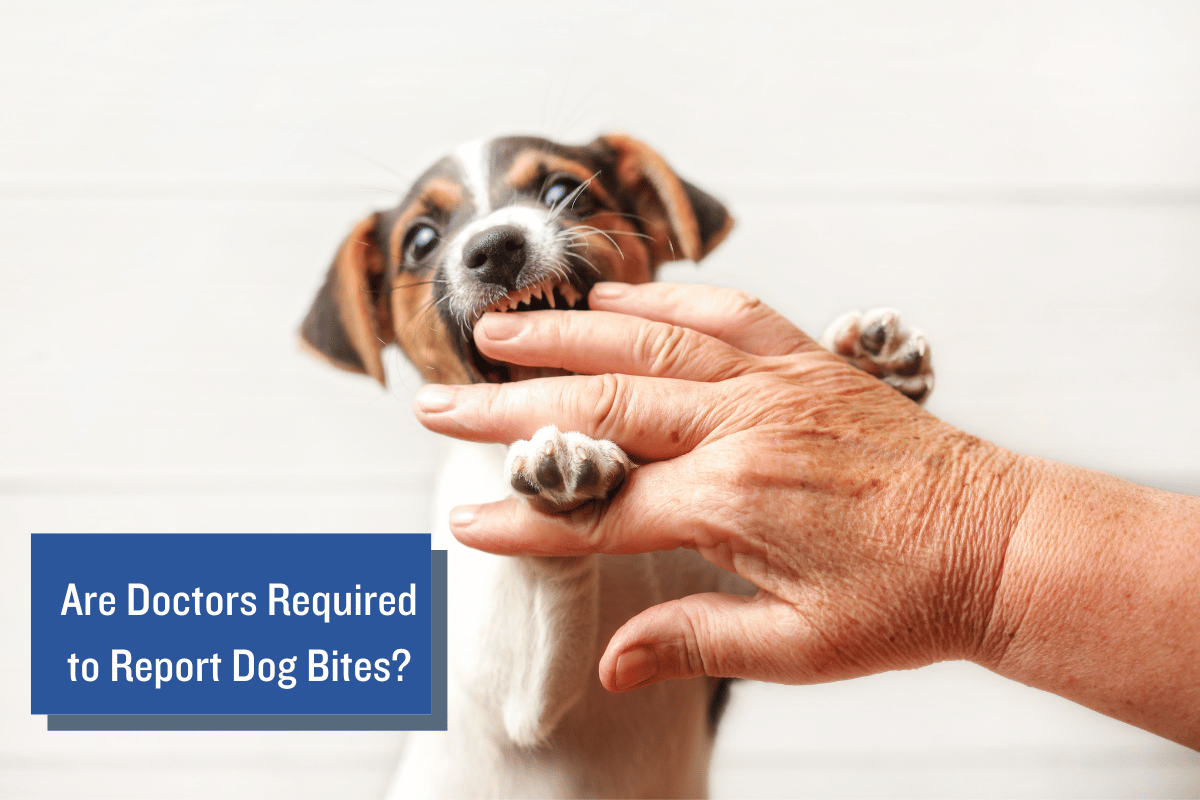Dog bites can vary from accidental nips to more serious incidents. If a bite from a dog requires a trip to the doctor, they may be required to report it. Different states have different dog bite laws, so it will depend on where you live. Let’s break it down.

Which US states require doctors to report dog bites?
Currently, doctors are required by law to report dog bites on humans to the police or relevant authorities in the following US states.
Alabama
Arizona
Arkansas
California
Colorado
Connecticut
Delaware
Hawaii
Illinois
Indiana
Kansas
Kentucky
Louisiana
Maryland
Massachusetts
Minnesota
Missouri
Montana
New Jersey
New York
North Carolina
Ohio
Oregon
Pennsylvania
South Carolina
Texas
Utah
Vermont
Virginia
Wisconsin

Which don’t?
In the following states, doctors are not required by law to report dog bites to the authorities, unless rabies is suspected in the patient.
Alaska
Florida
Georgia
Idaho
Iowa
Maine
Michigan
Mississippi
Nebraska
Nevada (except Las Vegas)
New Hampshire
New Mexico
North Dakota
Oklahoma
Rhode Island
South Dakota
Tennessee
Washington
West Virginia
Wyoming
What are the dog bite laws in the US?
Dog bite liability refers to the “onus of liability,” which lies with dog owners in the instance of a reported dog bite. The concept is built on three core constructs that govern dog ownership and the question of liability.

Some degree of dog bite liability exists in all fifty US states but differs from state to state, so be sure to do your research into your state laws. The three types of dog bite liability are explained below.
Dog bite statute – This means that the legal liability lies with the dog owner in the instance of a dog bite, regardless of whether they were present at the time and place of the incident and whether or not the bite was accidental or malicious.
One-bite rule – This is a slightly more lenient stance that protects dog owner liability for first-time offenders. According to this rule, the dog owner will only be liable once the dog is proven to exhibit dangerous behaviors on a recurring basis.
Dog owner’s negligence – This rule requires proof that the owner failed to keep their dog under control.
What are the most common exceptions to liability under a dog bite statute?
There are a few different exceptions to liability with dog bites, but they vary state by state. So, again, be sure to research your state laws, but generally, the exceptions to liability include the following.
Trespassers such as burglars
Provocation such as threatening or aggressive behavior towards your dog, yourself, your home, or another person or animal
Damage to your home or property
Military dogs or law enforcement dogs that bite on duty
Locational liability relating to where the dog was when the incident occurred
Are there legal repercussions for dog bites?
In most states in the US, when a person or pet is injured by a dog following an unprovoked bite or attack, legal consequences are possible. This can include fines, and in extreme cases, prison time or even enforced euthanasia for the dog.
Can a dog be euthanized for biting someone?
As mentioned above, in very extreme cases that result in life-changing injuries or death, dogs can be removed from their owners and forcibly euthanized so that they don’t hurt or kill anybody else.
What is rabies?
Rabies is a rare but serious infection that’s typically passed onto humans from a bite or scratch of an infected animal. It’s almost always fatal once symptoms appear, but early treatment can prevent this, which is why doctors always report bites from rabid dogs. That said, it is very rare in Western countries and most pet dogs are vaccinated against it.
Symptoms of rabies in humans include numbness or tingling around the bite or scratch, hallucinations, anxiety, mania, difficulty swallowing or breathing, and paralysis. In dogs, it can include fever, difficulty swallowing, excessive drooling, staggering, seizures, aggression, and paralysis.
What are the types of dog bites?
The four main types of dog bites are puppy biting, play biting, defensive biting, and attack biting. Puppy biting, or teething bites, can be annoying but are ultimately harmless and non-malicious. They are purely instinctive and will eventually be grown out of with age, maturity, and training. Play bites are also harmless and occur during play.
Defensive biting tends to be short, sharp snaps that a dog will use to communicate when they feel under threat. This often happens with little children who aren’t aware of how to interact properly with pets, so it’s important to teach young children how to interact with pets safely and respectfully.
Attack biting is when a dog bites somebody or another animal without reason or provocation. This is most often linked to a lack of training and socialization. It also occurs in some breeds more than others, most often in breeds with a genetic history of guard work and dogfighting, such as Pitbulls.
Which dog breed bites the most?
It’s important to remember that serious and fatal dog attacks are a rare occurrence, but according to public records, since 2016, 65% of fatal dog attacks in the US have been from Pitbulls. They have accounted for 284 deaths since 2016.
The second most common culprit is Rottweilers, although their numbers are significantly lower with 45 deaths, accounting for 10% of them. German Shepherds are third on the list, causing a total of 20 deaths since 2016.
What will happen if my dog bites someone?
In most US states, if your dog bites somebody who was posing a threat to you, them, your home, or somebody else, you will not be held liable for any injury they sustain. If the person in question was posing a serious threat, you should also report them to the police.
If the incident was unprovoked you should seek help for your dog’s behavior. Legal consequences are uncommon but can happen in serious cases. You should also make sure that the person affected gets any medical help they need and offer to pay for it if you can.
What happens if my dog bites another dog?
Owners of dogs that get seriously attacked by another dog are legally within their rights to report the owner to the authorities. Legal consequences can occur if the injuries are severe unless the other dog was the aggressor and your dog was defending themselves or you.
If your dog attacks another dog without provocation and hurts them significantly, you should also offer to pay for their veterinary treatment if you can.
Why did my dog bite someone?
There are several reasons why a dog may bite somebody or another dog without provocation. Sometimes, when a dog has a traumatic or abusive background, they can perceive a threat where there is none. Dogs that do not have a traumatic or abusive history can display unprovoked aggression due to extreme boredom, anxiety, or illness.
If a dog doesn’t get enough exercise or mental stimulation, their pent-up energy can cause them to engage in destructive behaviors, and in extreme cases, aggression. Lack of companionship can also lead dogs to engage in random aggressive behaviors to seek their owner’s attention.
Extreme anxiety can also cause dogs to bite. According to the Merck Veterinary Manual, anxiety in dogs is most commonly caused by phobias, separation, and old age. Injuries and certain illnesses such as sight loss, hearing loss, canine cognitive dysfunction, and brain tumors can also make dogs bite unnecessarily. This may be because they feel vulnerable, overstimulated, or because they perceive a threat where there isn’t one.
How to handle unprovoked aggression in dogs
If your dog bites somebody or attacks another dog without threat or provocation, you should consider the cause of their aggression and take action against it, inform your vet of what has happened, and consult a trainer or behaviorist if necessary.
In the meantime, you should take precautions to prevent them from hurting somebody else, such as keeping them on the leash, avoiding strangers or other dogs on walks, and muzzling them in public wearing if necessary.
How to prevent dog bites?
The best way to prevent aggression in dogs is to train and socialize them from an early age. Socialization allows dogs to observe the behavior of others and learn social cues. You can do this by introducing your dog to trusted people and other dogs and rewarding positive interactions.
Any negative interactions with other dogs at an early age should be redirected with treats and toys to neutralize the experience and stop any bad habits or fears from forming. If you’re struggling to train your dog, don’t be afraid to reach out to a professional for help.
Doctors are required to report dog bites to the authorities in most US states, and all states where cases of rabies are suspected. To prevent and manage canine aggression, train and socialize your dog alongside a trained professional if necessary, and always report dangerous dogs to the authorities.


